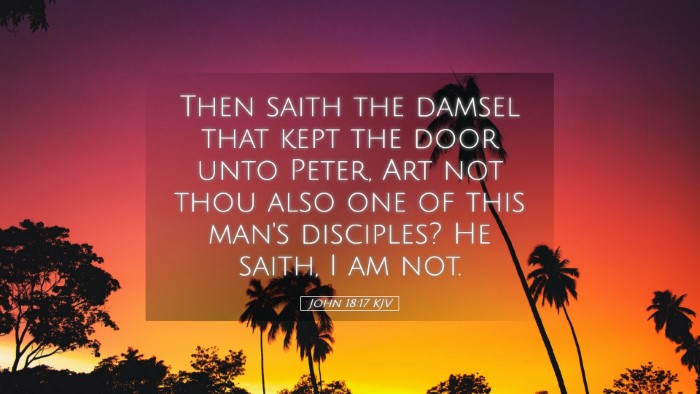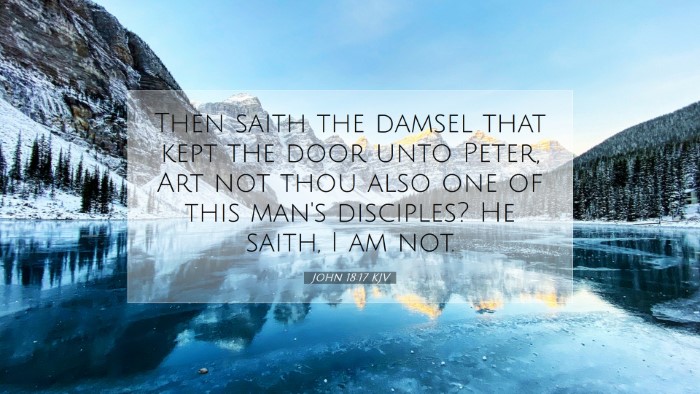Commentary on John 18:17
John 18:17 states, "Then the maid that kept the door said unto Peter, Art not thou also one of this man’s disciples? He said, I am not."
This verse presents a moment of vulnerability and denial in Peter’s life, encapsulating significant theological implications regarding faith, fear, and the human condition.
Contextual Overview
In the context of the Gospel of John, this moment occurs during Jesus' arrest and subsequent trial. Peter, a devoted disciple, finds himself faced with a perilous situation outside the High Priest's palace. The psychological and emotional weight of Peter's response invites deep reflection.
Exegesis of John 18:17
This verse represents a critical turning point where Peter grapples with his identity as a disciple. The question posed by the maid signifies an opportunity for confession or denial, serving as a paradigm for the struggles faced by many believers.
Analysis from Public Domain Commentaries
Insights from Matthew Henry
Matthew Henry emphasizes the folly of denying one's identity in Christ. He notes that Peter’s denial was not just a personal failing but reflected a broader human tendency to falter under pressure. Henry posits that this interaction unveils the weakness of man, even a devoted disciple like Peter, when confronted with fear.
- Fear and Cowardice: Henry asserts that fear often leads to cowardice, which can compel believers to deny their faith in moments of adversity.
- Importance of Watchfulness: He exhorts readers to maintain vigilance and prayer, citing that spiritual preparedness can guard against such moments of weakness.
Insights from Albert Barnes
Albert Barnes expands upon the socio-political dynamics at play. He notes that Peter was aware of the risks associated with being identified as a disciple of Jesus, especially in the volatile atmosphere surrounding Jesus’ arrest. Barnes suggests that Peter's denial highlights the struggle between the spirit and the flesh, resonating with believers' inner conflicts.
- Social Pressure: Barnes argues that societal pressures compel individuals to conform, prompting a denial of one's beliefs.
- Contrasting Responses: He contrasts Peter's initial boldness in cutting off Malchus' ear with his subsequent fear, revealing the complexity of human nature.
Insights from Adam Clarke
Adam Clarke offers a detailed examination of the text's language and implications. He discusses the nature of the exchange between Peter and the maid, suggesting that it underscores the theme of recognition versus anonymity in the Gospel narrative.
- The Symbolism of the Maid: Clarke interprets the maid's role as a symbol of human authority that tests the authenticity of one's faith.
- Implications of Denial: He notes that Peter's denial foreshadows the challenge all Christians face in confessing their faith amidst worldly pressures.
Theological Reflections
John 18:17 serves as a mirror reflecting the struggles of faith under duress. It provokes questions about identity, courage, and the nature of discipleship. The collective insights from Henry, Barnes, and Clarke illuminate the multifaceted implications of Peter’s denial.
Applications for Today
This passage encourages contemporary readers to reflect on their own responses to similar situations of pressure and fear.
- Awareness of Weakness: Understanding human fragility can cultivate humility and reliance on God’s strength.
- Encouragement for Confession: Believers are urged to embrace their identity in Christ boldly, even in challenging contexts.
- Gospel Assurance: The overarching narrative of redemption assures us that even in our failures, grace abounds.
Conclusion
John 18:17 is a poignant reminder of the temptations to deny one’s faith in the face of adversity. Through the insights provided by esteemed commentators like Matthew Henry, Albert Barnes, and Adam Clarke, it is clear that this scripture demands thoughtful reflection and encourages believers to stand firm in their identity as disciples of Christ, irrespective of the challenges that lie ahead.


